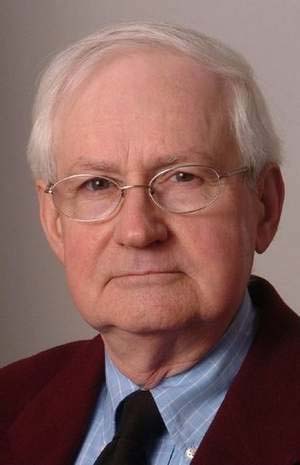
Gordon R. Mork Award

This award honors our colleague, Professor Gordon Robert Mork (1938-2012), who taught in the Department of History from 1970 to 2010. Gordon earned his Ph.D. from the University of Minnesota in 1966. His research topics included modern German history, the Holocaust, the Oberammergau Passion Play and History education. Among other roles, he served as department head (1998-2003), as an officer in the International Society for History Didactics, as a member of the Jewish Studies Committee at Purdue, and on the Board of Governors of the Tippecanoe County Historical Association.
Purpose: The Department of History is pleased to announce its annual Gordon R. Mork Award for the best undergraduate student paper in a European, U.S., or Global History course, addressing a theme or topic on such issues as cross-cultural comparisons, international relations, and global exchange and interdependence.
Criteria: The paper (15-25 pages in length) may come from any history course (European, U.S., or world history) offered during one calendar year previous to the submission deadline, as long as it integrates primary-source research, and offers an original interpretation. Chapters from undergraduate History Honors theses are eligible, as well as papers arising from the HIST 395 and HIST 495 history research seminars, 400-level courses, and 590 independent studies.
Award: The winner will be announced at the departmental Spring Awards Reception and will receive a prize of $200 with a certificate of recognition.
Apply: Gordon R. Mork Award Application
Deadline: Materials must be received by January 26, 2025.
Past Winners:
2024 - Peyton Edelbrock, “Cooling the Cold War: Eugene Cernan’s Cosmonaut Friendships that Broke Barriers”
2023 - Alyson DeHaai, “Heroines and Housewives: the Complex Legacy of Belgian Gender Roles in World War I”
2022 - Ally Eaton, “The Quiet Effects of Famine: Starvation and Epigenetics”
2021 - Nicholas Short, “Politics and Nationalism in Early Eighteenth-Century English Almanacs.” This paper uses an extensive array of primary sources, 41 almanacs printed in England in the early eighteenth century. The author shows how these almanacs transferred ideas about politics and gender using history, poetry, astrology and scientific information to promote a cohesive English identity. The almanacs paid particular attention to English nationalist identity by using the French as a counterpoint, an example of how not to construct a political society.
2019 –Sarah Weaver, “Politics on the Periphery: Oscar Ewing and a Special Relationship with Israel.” Using a good variety of documents from several important archives Sarah Weaver reveals a so far little known aspect of the “special relationship” between the US and Israel: the founding role played in it by Hoosier and IU graduate Oscar Ewing, who in the 1940s and 1950s crucially advised President Truman on the matter and who later became himself instrumental in cementing the cooperation ties between the US and Israel. The paper is well researched and argued and, among other things, shows the importance of the personal convictions of individual government officials in the development of foreign policy.
2018 – Jack Maszka, for the paper, “Depictions of Ethnic, Religious, and Ideological Divides in The Arab-Israeli Cookbook,” which interprets a series of images, by applying cultural as well as gender categories of analysis, to dissect the subtle ways in which Robin Soans’s, The Arab-Israeli Cookbook, revealed cultural and economic commonalities and divides, as well as reinforced biases and stereotypes.
2017 - Michael Brannigan, for the paper, "America's First Cosmonauts: The Human Cost of Shuttle-Mir," a study of the challenges that the seven Space Shuttle astronauts faced while serving aboard the Russian Mir space station between 1993 and 1998: mastering the everyday and technical intricacies of the Russian language; living in Russia during the post-Soviet economic collapse; and adapting to new institutional procedures and training methods under the Russian Space Program.
2016 - Andrea Matio, for the paper, “Harem Girls and Handsome Sheiks: A Reconsideration of American Orientalism via the 1893 Columbian Exposition and Early Hollywood Films,” a wide-spanning study that links cultural history and immigration history, challenges Edward Said’s “orientalism,” and delves into the archival sources of Chicago and Los Angeles to show how Arab-Americans participated in the production of stereotypical images.
2015 - Kevin Adams, for the paper, “International Women’s Day 1979: Disorganization in a Polyvalent Iranian Women’s Movement,” a nuanced study of the women’s protest movement following the Iranian Revolution, which integrates a wide variety of American, British and French original sources to discuss both the organizational structure and the ideologies of the Iranian women's demonstrations, which were threaded with feminist, socialist, anarchist, and religious influences.
2014 - Ashley M. Sankari, for the paper, “Impartiality Reconsidered: Al Jazeera and Jessica Lynch,” which explored the abduction and rescue of U.S. Army private Jessica Lynch during the Iraq War (2003), weighing transcripts of the various media outlets to compare Al Jazeera’s relatively accurate and critical coverage against against the misrepresentations and exaggerations of American newspaper and television reporters.
2013 - Mae Christiansen, for the paper, "In the Boiling Caldron of War: Gender and Female Combatants in the First World War," a study of female battalions in the First World War across several fronts, including various international actors, and bridging the war experience with cosmopolitan standards of femininity and masculinity.
2012 - Lisa Olszewski, for the paper, "Swaying Switzerland: The Use of British Propaganda in Switzerland, 1943-1945,” which researched primary sources (British government documents) and offered a new interpretation about the application of wartime propaganda in the complex international relations between Switzerland, Great Britain, and Germany during the Second World War.